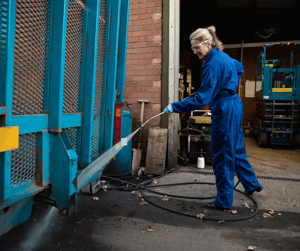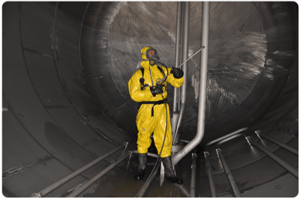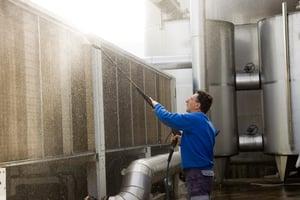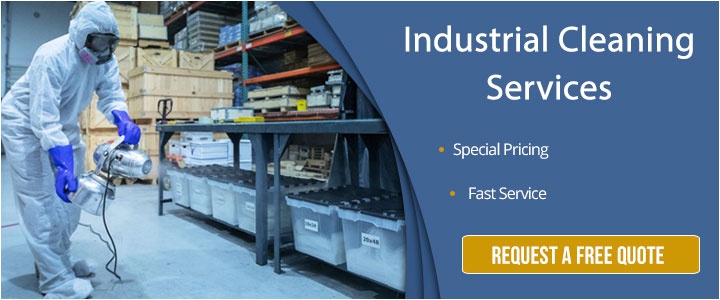While household cleaning agents may work for minor tasks, the challenges posed by your industrial environment often require specialized chemicals and cleaning equipment.
From tanks to machinery, floors and other spaces within your factory, your environment can be harsh … and may require strong chemicals and cleaning agents to get the job done.
Why Industrial Cleaning Is Important
Maintaining cleanliness in manufacturing facilities is not merely about aesthetics. It's a safety issue that also directly impacts productivity and efficiency. Cleanliness plays a pivotal role in ensuring a smooth production process for your manufacturing company and minimizing disruptions due to equipment failures or accidents.
impacts productivity and efficiency. Cleanliness plays a pivotal role in ensuring a smooth production process for your manufacturing company and minimizing disruptions due to equipment failures or accidents.
Equipment must undergo routine maintenance, but part of that maintenance should focus on cleanliness. The accumulation of dirt, dust or other contaminants can cause malfunctions and breakdowns. On the other hand, clean machinery operates more smoothly, with fewer instances of jams, blockages or malfunctions.
Accumulated debris, spills or residues can also create slip and trip hazards, increasing the risk of accidents and injuries among workers. Certain contaminants, like oil or grease, can pose fire hazards or contribute to equipment failures if not promptly addressed as well.
By maintaining clean and hazard-free workspaces, manufacturing facilities can uphold high safety standards, protect employees from harm and comply with regulatory requirements.
Common Cleaning Challenges In Manufacturing Spaces
Keeping manufacturing environments clean can be challenging because of the different contaminants, equipment and surfaces present. Addressing these challenges effectively requires a comprehensive understanding of the specific cleaning needs and tailored solutions to overcome them, including using chemicals to clean.
Before you choose which chemical cleaning solutions best meet the needs of your working spaces, it’s important first to identify any typical contaminants present. Manufacturing facilities are susceptible to various types of contaminants that can accumulate on surfaces and equipment over time. Common contaminants include oils, greases, lubricants, dust, dirt, rust, scale, residues from production processes, and even microbial growth in certain industries.
Another challenge is reaching and cleaning inaccessible areas within equipment, machinery and facility infrastructure. Tight spaces, intricate machinery components and complex geometries often make it difficult to effectively clean every surface. Accumulated contaminants in these inaccessible areas can harbor bacteria, cause corrosion or impede equipment performance.
Specialized cleaning techniques, tools and equipment designed to access and clean confined spaces effectively can help you reach difficult spaces.
Manufacturing environments often feature diverse surface materials as well, from metals to plastics, ceramics, glass and composite materials. There’s also the complex equipment you have on site to consider. For example, your tanks often require specialized processes provided by industrial tank cleaning services.
Overcoming these common challenges requires a proactive approach that includes proper planning, selection of suitable cleaning agents and techniques, and adherence to safety protocols.
Types Of Industrial Chemical Cleaning Solutions
Industrial chemical cleaning solutions often involve the use of specialized chemicals to break down and remove stubborn deposits, residues and contaminants from surfaces. Different chemicals are used based on the nature of the substances being removed.
stubborn deposits, residues and contaminants from surfaces. Different chemicals are used based on the nature of the substances being removed.
Here are some common types of industrial chemical cleaning solutions you may need for your facility.
Degreasers And Solvent Cleaners
Degreasers play a crucial role in industrial cleaning by effectively removing oils, greases and other organic contaminants from surfaces and equipment. These powerful cleaners work by breaking down and emulsifying the hydrophobic compounds found in oils and greases, allowing them to be easily rinsed away with water.
Degreasers are commonly used in manufacturing facilities to clean machinery, engine parts, tools and work surfaces, helping to maintain optimal operational efficiency and prevent corrosion.
In specialized applications where water-based cleaning solutions are not suitable, solvent cleaners offer an alternative solution. Solvent cleaners are particularly effective in removing stubborn or dried-on contaminants that may be resistant to water-based cleaning agents. These solvents can penetrate and dissolve various types of residues, including adhesives, resins and paint overspray, without leaving behind any residue. However, use solvent cleaners with caution, as they may pose health and environmental risks. Proper ventilation and personal protective equipment should be utilized when handling these chemicals.
Alkaline Cleaners
Alkaline cleaners are highly effective in tackling heavy-duty soils like rust, scale and mineral deposits commonly found in industrial settings. These cleaners work by breaking down the bonds between contaminants and surfaces, allowing them to be easily lifted and rinsed away.
Alkaline cleaners are formulated with alkaline substances like sodium hydroxide or potassium hydroxide, which help to neutralize acids and dissolve mineral-based residues effectively.
One of the key advantages of alkaline cleaners is their versatility in cleaning various surfaces, including metals, ceramics, plastics and even glass. They can be used in immersion baths, spray washers or manual cleaning applications, making them suitable for a wide range of industrial cleaning tasks. Alkaline cleaners are often biodegradable and environmentally friendly, minimizing the impact on wastewater treatment systems and reducing overall environmental footprint.
Acidic Cleaners
Acidic cleaners are specifically formulated for dissolving mineral deposits, scale and rust commonly encountered in manufacturing environments. These cleaners contain acidic compounds such as phosphoric acid, hydrochloric acid or citric acid, which react with and dissolve mineral-based contaminants effectively.
Acidic cleaners are particularly useful for descaling boilers, heat exchangers, pipes and other equipment where mineral buildup can impair performance and efficiency.
While acidic cleaners offer excellent cleaning capabilities, it is essential to exercise caution when handling them due to their corrosive nature. Proper safety precautions should be followed, including wearing protective clothing, gloves and eyewear, and ensuring adequate ventilation in the workspace. Acidic cleaners should be used judiciously and only on surfaces compatible with acidic solutions to prevent damage or etching.
Other Specialty Cleaners
Specialty cleaners are tailored for specific industries or applications to address unique cleaning challenges and requirements. These cleaners are formulated with specialized ingredients and additives to meet the specific needs of industries like food processing, pharmaceuticals, electronics, automotive and aerospace. For example, food-grade cleaners are designed to meet strict regulatory standards for use in food processing facilities, ensuring product safety and compliance with food safety regulations.
Similarly, electronics-safe cleaners are formulated to clean sensitive electronic components and circuitry without causing damage or corrosion. These cleaners are non-conductive and residue-free, making them ideal for removing flux residues, fingerprints and other contaminants from circuit boards, connectors and electronic equipment.
Specialty cleaners are essential tools for maintaining cleanliness, hygiene and compliance in specialized industrial environments, where standard cleaning agents may not suffice.
When Specialized Cleaning Solutions Are Needed
Maintaining cleanliness in a manufacturing facility involves more than just wiping surfaces with a cloth and standard cleaning agents. Certain areas within the factory pose unique challenges that demand specialized industrial cleaning solutions.
cleaning agents. Certain areas within the factory pose unique challenges that demand specialized industrial cleaning solutions.
Here are some instances where professional cleaning expertise may be needed:
Tanks And Vessels
Tanks used for storing chemicals, liquids or raw materials often accumulate residues, scale and other contaminants over time. Cleaning these tanks thoroughly requires specialized equipment and techniques to ensure the complete removal of deposits and prevent cross-contamination.
Professional industrial cleaning services employ high-pressure water jets, steam cleaning or chemical cleaning agents tailored to the specific requirements of tank cleaning.
You can read more about this process in our article, Industrial Tank Cleaning Services For Commercial Sites.
Floors And Drains
Factory floors are subjected to heavy foot traffic, spills and equipment operation, leading to the accumulation of dirt, grease, oils and other residues. Cleaning large floor areas efficiently and effectively requires industrial-grade cleaning equipment, including floor scrubbers, sweepers or pressure washers, capable of removing stubborn stains and debris.
Maintaining clean floor drains is also essential to prevent blockages and ensure proper drainage, requiring specialized cleaning techniques to remove accumulated sediments and residues.
HVAC Systems And Ductwork
Heating, ventilation and air conditioning (HVAC) systems play a critical role in maintaining indoor air quality and regulating temperature and humidity levels in manufacturing facilities.
However, over time, HVAC ductwork can become contaminated with dust, mold, allergens and microbial growth, compromising air quality and system efficiency. Professional industrial cleaning services utilize specialized equipment, such as duct cleaning brushes, vacuums and disinfectants, to remove contaminants from HVAC systems and ensure optimal performance and air quality.
Machinery And Equipment
Manufacturing machinery and equipment are prone to accumulating oils, greases, residues and other contaminants during operation, leading to decreased efficiency and potential equipment failures.
Cleaning complex machinery and equipment requires specialized knowledge of equipment components, materials and cleaning agents to avoid damage or corrosion. Professional industrial cleaning services employ trained technicians and customized cleaning protocols to safely and effectively clean machinery surfaces, components and intricate parts.
Confined Spaces And Elevated Surfaces
Factory environments often contain confined spaces, elevated platforms and overhead structures that are challenging to access and clean using conventional methods. Cleaning these areas safely and thoroughly requires specialized equipment, including aerial lifts, scaffolding or confined space entry equipment, along with trained personnel certified in confined space entry procedures.
Professional industrial cleaning companies are equipped to navigate and clean confined spaces and elevated surfaces, minimizing risks and ensuring compliance with safety regulations.
Specialized industrial cleaning solutions are indispensable for addressing the unique challenges posed by various areas within a manufacturing facility. From tank cleaning to floor maintenance, HVAC system cleaning, machinery cleaning and cleaning of confined spaces, professional industrial cleaning services offer expertise, equipment and resources to ensure thorough and effective cleaning.


Comment